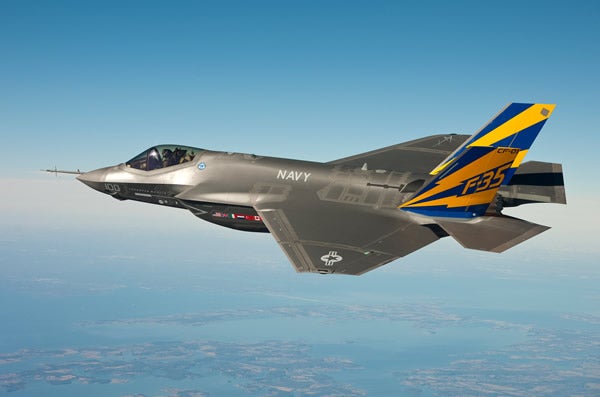Last week, the British government made a decision to change from the Carrier Variant of the Joint Strike Fighter (JSF) back to the Short Take Off and Vertical Landing (STOVL) variant of the JSF—as was originally planned before its 2010 Strategic Defence and Security Review. While this move was politically challenging for the coalition government in the U.K., it was the right decision. The assumed cost of equipping the U.K.’s new generation of aircraft carriers with catapults and arrestor gear that are required for the Carrier Variant of the JSF increased from £500 million to £2 billion in only 12 months. To place these figures in context, the U.K.’s Foreign Office budget for this year is only £1.6 billion.
So what does this mean from an American perspective? It doesn’t matter to the Pentagon what variant of the JSF the U.K. chooses, as long as the U.K. stays committed to the JSF program. The U.S. should be concerned about the position of the Labour Party, which currently forms the U.K.’s official opposition.
The Labour Party is polling at its highest level since the May 2010 general election, when it was kicked out of government after 13 years. So far, it is unclear whether it would commit to continuing and funding the U.K.’s involvement in the Joint Strike Fighter program if Labour were to form the next U.K. government. This lack of clarity on such an important aspect of the Special Relationship should be a concern for the Department of Defense and Capitol Hill.
As previous Heritage analysis has pointed out, the Joint Strike Fighter program was one of only four areas the U.S. wanted the U.K. to protect from defense cuts. (The other three areas were U.K. Special Forces, the Royal Navy’s Mine Counter Measure Vessels, and Britain’s nuclear deterrent.) An important part of the Special Relationship between the U.S. and the U.K. is close collaboration on, and joint procurement of, military equipment. Since the U.K. is the JSF program’s only Level 1 partner, the JSF program demonstrates how the Special Relationship works in practice.
Flying a fifth-generation fighter, regardless of what variant it might be, will place the U.K. in the premier league of air power capability—ahead of both Russia and China. It is important that, as the program’s only Level 1 partner and for the sake of the Special Relationship, the U.K. stays committed to the JSF program.





























